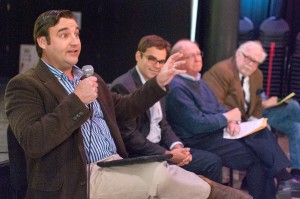Panelists discuss the ethics of government surveillance
The USC Dornsife College of Letters, Arts and Sciences’ Levan Institute for Humanities and Ethics hosted a Coffeehouse Conversation, a series of talks in which faculty and students discuss ethical questions, at Ground Zero Performance Cafe Wednesday afternoon.

Crisis looming · Ph. D candidate in political science and international relations Matthew Gratias discusses government’s place in democracy. – Chris Roman | Daily Trojan
Lyn Boyd-Judson, an organizer for the event, said the idea for Coffeehouse Conversations formed six years ago when she and Sharon Lloyd, a professor of philosophy, discussed taking a small group of philosophy students and having the Levan Institute institutionalize the program as a larger interdisciplinary effort.
Lloyd has organized all of the Coffeehouse Conversations since then.
“I think the Coffeehouse Conversations are a great addition to our campus dialogue, and we feel fortunate enough to be in a position to make that happen,” Boyd-Judson said.
Wednesday’s discussion, entitled “Democratic Transparency and State Secrets: A Question of Values,” involved Edward Snowden’s leaked details about American and British mass government surveillance.
Snowden, a former CIA and NSA employee, revealed highly confidential information to the press in May 2013. The media and the public have given him various titles, ranging from “hero” to “traitor,” and his actions are still a topic of controversy.
The Levan conversation, however, did not focus entirely on Snowden and his actions. Instead, panelists mainly drove the discussion by expressing their personal thoughts on surveillance and its role in the American government.
The panel members came from a variety of backgrounds, including a former NSA contractor and appointee of the Obama administration.
The panelists were Tiffany Chang, a doctoral candidate in philosophy; John Dreher, a philosophy professor at Dornsife; Matthew Gratias, a former NSA contractor and current doctoral candidate; Ari Ratner, a fellow at the Truman National Security Project and former appointee at the Department of State; Michael Shapiro, a professor at the USC Gould School of Law and Kevin Starr, a history professor at Dornsife. Lloyd moderated the discussion.
Chang explored the concept of political discourse and why it is important to the flourishing of a democracy.
“[Communication] enables us to be more responsible citizens, to be informed about the decisions we make as citizens, about policies that affect not just us but others as well,” Chang said. “So the important question that I encourage you to think about today is, ‘What if secret surveillance has an undermining effect on political discourse, and why the ordinary citizen in a democratic society should be concerned?’”
Several members of the panel discussed the thin line between security and privacy.
“You have to agree to some degree of surveillance,” Shapiro said. “There are things you have to give up for security, and that is autonomy, privacy, confidentiality, transparency — all different concepts.”
Shapiro even referenced recent attacks on the nation and citizens’ reactions to the events.
“Something happened in Washington yesterday, and people start saying, ‘Why didn’t they see it coming?’” Shapiro said. “But if you start specifying what operation you use to perform in order to make sure you see it coming, the same people who said, ‘Why didn’t they see it coming?’ are going to start objecting.”
Many students appreciated the variety of speakers selected for the discussion.
“They had very qualified speakers. I especially appreciated Ratner and Gratias because they seemed to have the most physical firsthand connection with the issue,” Andrew Schmidt, a sophomore majoring in philosophy, politics and law, said. “[The panelists] seemed relatively stable in their view that some surveillance regardless of your direct consent was necessary … I’d like to see a panel composed of vigorously anti-government, anti-NSA types because you’d get a very different account.”
Several of the students who attended found that though the discussion was enlightening, their own opinions of Snowden’s actions and controversy surrounding government surveillance remained unchanged.
“My main thought after this is I don’t really have a problem with any type of security, any type of data watching,” Reed Foster, a senior majoring in philosophy, politics and law, said. “I never have, and I think that if the government wants to track my behavior down to the tee, as long as they don’t interfere with my personal life, I don’t really care. They can do whatever they want.”
Others, such as Arjun Ahuja, a sophomore majoring in philosophy, politics and law, voiced a different opinion on government surveillance based on personal experience.
“I think it comes from my background as a Sikh American, with someone who wears a turban and a beard. I think the potential for abuse with surveillance systems, especially when it’s being used now to specifically target potential terrorists, is a huge problem,” Ahuja said. “Because surveillance now has a specific purpose, the tendency to profile has really increased. That is my biggest problem with it. Giving up one’s personal liberties for the sake of security is completely unreasonable.”
Follow us on Twitter @dailytrojan
